
|
Astronomy Picture Of the Day (APOD)
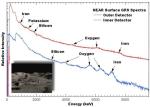 Survivor: NEAR Shoemaker On Asteroid Eros
Survivor: NEAR Shoemaker On Asteroid Eros
5.03.2001
Not part of a television game series, the NEAR Shoemaker spacecraft survived its unprecedented landing on an on asteroid last month. As suggested in the illustration inset above, the car-sized probe likely rests gently on the tips of its solar panels having touched down under the influence of asteroid Eros' feeble gravity.
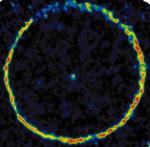 TT Cygni: Carbon Star
TT Cygni: Carbon Star
4.03.2001
TT Cygni is a cool red giant star with a wind. This false-color picture of TT Cyg was made using a coordinated array of millimeter wavelength radio telescopes and shows radio emission from carbon monoxide (CO) molecules in the surrounding gas.
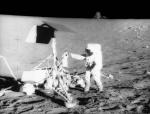 Apollo 12 Visits Surveyor 3
Apollo 12 Visits Surveyor 3
3.03.2001
Apollo 12 was the second mission to land humans on the Moon. The landing site was picked to be near the location of Surveyor 3, a robot spacecraft that had landed on the Moon three years earlier.
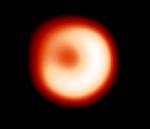 LkHa101: The Hole in the Doughnut
LkHa101: The Hole in the Doughnut
2.03.2001
You'd need a really big cup of coffee with this doughnut ... because the hole in the middle is about a billion kilometers across. Centered on the Sun, a circle that size would lie between the orbits of Mars and Jupiter.
 Maximum Sun
Maximum Sun
1.03.2001
Astronomers recently witnessed an astounding, large scale solar event as the Sun's north and south magnetic poles changed places! But, this complete solar magnetic field flip was actually anticipated. It occurs every 11 years during the maximum of the solar activity cycle.
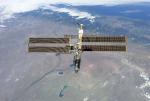 A Space Station Meets its Destiny
A Space Station Meets its Destiny
28.02.2001
The International Space Station (ISS) had a date with Destiny earlier this month. More specifically, the crew of the Space Shuttle Atlantis installed the science laboratory named Destiny on the ISS. Destiny, pictured here, will also serve as a control center for the Earth orbiting space station.
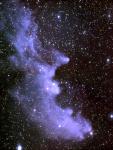 The Witch Head Nebula
The Witch Head Nebula
27.02.2001
Double, double toil and trouble; Fire burn, and cauldron bubble -- maybe Macbeth should have consulted the Witch Head Nebula. This suggestively shaped reflection nebula is associated with the bright star Rigel in the constellation Orion.
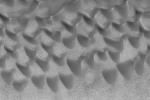 Sand Dunes on Mars
Sand Dunes on Mars
26.02.2001
Sand dunes on Mars can appear exotic. The dark dunes above might be compared to shark's teeth or chocolate confections. In reality, they arise from the complex relationship between the sandy surface and high winds on Mars.
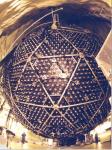 The Sudbury Neutrino Detector
The Sudbury Neutrino Detector
25.02.2001
Two thousand meters below the ground, a giant sphere has begun to detect nearly invisible particles. These particles, neutrinos, are extremely abundant in the universe but usually go right through just about everything. By stocking this 12-meter sphere with an unusual type of hea
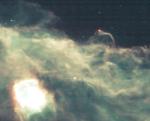 Infrared Horsehead
Infrared Horsehead
24.02.2001
This famous cosmic dust cloud was imaged in infrared light by the European Space Agency's Infrared Space Observatory (ISO) satellite. The false-color picture shows the bright infrared emission from dust and molecular gas in part of the Orion star forming region surrounding the Horsehead Nebula.
|
January February March April May June July August September October November December |
|||||||||||||||||||||||||||||||||||||||||||||||||